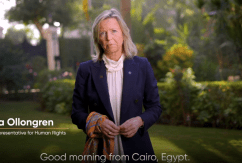World Refugee Day: Joint Statement by the European Commission and the High Representative

“Today, more than 110 million people are forcibly displaced around the world. On the occasion of World Refugee Day, we reiterate the EU’s commitment to continue being a leading humanitarian and development donor and to step up our efforts to ensure that the EU remains a place where refugees find protection and safety.
Globally, the EU is working to help improve the situation of millions of refugees and forcibly displaced persons caught up in conflicts or major humanitarian crises such as those in Afghanistan, Syria, Venezuela, Myanmar, Yemen, South Sudan, Sudan, the Democratic Republic of the Congo and Burkina Faso. We deliver life-saving aid including food, shelter, education, health care, as well as livelihood support.
While the vast majority of those forcibly displaced are outside the EU, we also support significant numbers of refugees in Member States.* In particular, with Russia’s war against Ukraine, today Member States are hosting around 4 million people from Ukraine under temporary protection, with more than half being women and children. The EU also provides protection and humanitarian assistance to internally displaced persons in Ukraine, and we support refugees from Ukraine in the Republic of Moldova.
The journeys of refugees are often full of hardship and danger, with thousands risking their lives across deserts and seas in the hope of a better future. The EU is committed to work on comprehensive action to prevent the loss of life and provide orderly and safe pathways. We are working with EU Member States and international partners on resettlement and complementary pathways that can help scale-up admission places, from priority regions. The EU resettlement and humanitarian admission scheme was launched by the European Commission on 10 May 2023, kicking off the new pledging exercise for 2024-2025.
The EU welcomes the upcoming Global Refugee Forum in December 2023 as an important opportunity to better share global responsibility: to be truly effective we must all step up our efforts and work in partnership to address the multiple complex challenges created by forced displacement.“





























 Syria
Syria 




